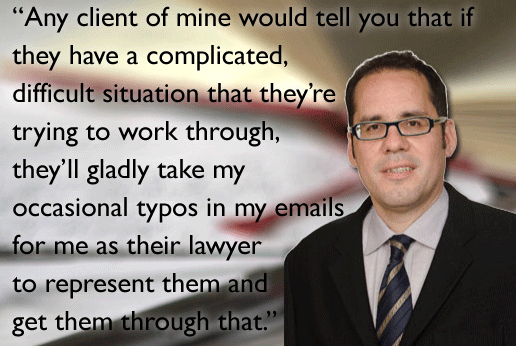Rafael Galvan, Attorney with Orrick’s Energy and Infrastructure Group

A lawyer and partner at the New York office of international law firm Orrick, Herrington & Sutcliffe, LLP, Rafael Galvan has worked on or led a number of deals that were honored with Deal of the Year Awards. While attending University of Pennsylvania Law School, Galvan sat on two law journals—one of which he founded with another student. After Law Review, it is the most sought-after journal at the school.
Rafael Galvan is a project finance lawyer and member of the Energy and Infrastructure group at a big international law firm, with more than 1,100 attorneys.
“Essentially, I work on large industry projects, like power plants, wind farms, satellites, and different kinds of commuter rail systems—all capital-intensive projects that have a long-term revenue stream,” he explains. Contracts this large and complicated need a lawyer who can spot the issues, one who is quick, and is able to negotiate and get people on the same page. Galvan is that kind of lawyer. Ironically, he is also the kind of person who has difficulty in spelling, writing, and reading—all issues relating directly to his dyslexia. Yet, dyslexia doesn’t affect his work in a negative way. “Any client of mine would tell you that if they have a complicated, difficult situation that they’re trying to work through, they’ll gladly take my occasional typos in my emails for me as their lawyer to represent them and get them through that,” says Galvan.
Early on in schooling, Galvan knew his strengths were in math and science; but he also knew that he had difficulty with the written and spoken word, and even had speech therapy and reading help in elementary school. His parents, particularly his father, believed that his difficulties with the written and spoken word may have had to do with the fact that Rafael lived in Germany for the first few years of his life. His father was supportive, and felt assured that dyslexia would not become a problem in his son’s life, that they would overcome it.
“He’s Peruvian and comes from a village where there’s no running water or electricity and ended up with three Ph.D.’s, so he thinks you can overcome anything,” Rafael says of his father.
“My father gave up pretty early on the reading/writing element with me and focused on math. While my sisters were working on reading and writing, my dad had me deep into algebra when I was in the third grade. It wasn’t at all bad news for me; even though it wasn’t helping to address the underlying issue, it certainly strengthened my math abilities, and ultimately I think that sort of logic and reading process helped me to get to where I am today.”
The path to law school was certainly circuitous. Galvan entered college at Rochester Polytechnical Institute. “I started off thinking I was going to be a physicist, and in large part it was because I had a hole in my abilities in English,” he recalls. But that hole became a motivating force to switch schools and major in English Literature. “At the time, I wasn’t thinking about being dyslexic. I was just reacting to this hole in my abilities and trying to overcome them,” says Galvan. “It probably took me a lot more time than my peers, but it was just a matter of giving the time. I did well in my major; I had a 3.8 or 3.9 GPA. I don’t recall ever having to sit in a room and take an exam and write. If that was what my major was, I wouldn’t have done as well.”
But Galvan obviously did do well in college, and also in law school, despite the divergence of his high intelligence and his reading ability. When applying to law school, Galvan had taken the LSAT twice, and the scores were aggregated—one score was in the 96th percentile, the other in the 75th percentile. He also had a 3.8 GPA for undergrad work and a recommendation from a federal court judge. “Had I gotten only the one score, I would have ended up probably in my top-choice law school—I still got into a good school, though,” Galvan reflects.
But the recommendation from the judge means more to Galvan than any test score. “Some of my achievements came through work. For instance, for my law school application, a judge from the District of New York wrote a recommendation for me after my having been in his court on a civil legal trial. He saw the unique role I played as a legal assistant and it’s probably rare for a federal judge to be writing a recommendation for some legal assistant in a courtroom, but he did so willingly,” he says. “I think that those recommendations, in terms of someone who is dyslexic, are a little more telling of much of what one does—your ability to problem solve, to be diplomatic, etc. These are all skills that you might not be showing on a standardized test, but which in a working context you have the opportunity to show.”
Law school highlighted the discrepancies between Galvan’s intelligence and his ability to read and write quickly. While still in the top half to top third in his class, he points out that, “One of the things about dyslexia is that it is all relative to what you could be doing.” He continues, “At least in my law school, there’s a small group of people who are always able to respond. Generally that group has very strong grades—not just decent grades, but very strong grades. In most of my sections and classes, I was part of that group verbally, but if you looked at my grades, they didn’t match. I think it’s because of the format of a law school exam—it’s probably one of the worst formats for a dyslexic. You’ve got to read a lot and you’ve got to write even more.”
At University of Pennsylvania Law School, Galvan proved to be a standout in several ways in terms of his contributions as a law student. He sat on two law review journals, which is incredibly rare, one being a journal he founded. “I wrote on the Journal of International Economic Law. That’s an honor to sit and write on. It’s kind of miraculous that I got on. It’s partially grade based and partially you have to edit for it,” he says. “I also started the Journal of Constitutional Law at Penn with another classmate which became Penn’s fourth law journal. It was a pretty big deal. Today I understand that, after the Law Review, it’s the most-wanted journal by law students.”
“For someone for whom the process of writing is long, arduous, and not at all fun, at least I have a story for law school,” Galvan says laughingly. He takes in stride the ups and downs of having dyslexia, and what shows is the positive—his intelligence, his perseverance and work ethic, and self-awareness. “I’m blessed in that, even though I’m dyslexic, in any context other than reading and writing, I’m hyper-quick. Because I’m lucky to be quick, even slowing me down isn’t as bad as slowing someone else down who isn’t as quick,” says Galvan.
Related

David Boies, Attorney & Chairman of Boies, Schiller & Flexner LLP
David Boies, perhaps the nation’s most highly acclaimed and sought-after attorney, is known for his brilliance, creativity and passion for justice. Boies has represented clients in many of the nation’s landmark high-profile cases, including Bush v. Gore, where he represented Vice President Al Gore in litigation surrounding the controversial 2000 presidential election; the U.S.
Read More
Bonnie Patten, Attorney & Executive Director of Truth in Advertising
Litigation attorney Bonnie Patten has successfully defended physicians and health care providers in complex and unique medical claims. Her expertise in health care litigation is so well respected that she has been asked to present at conferences on the subject.
Read More
David Schoenbrod, Professor of Law at New York’s Law School
David Schoenbrod is an attorney, professor, and author who is nationally recognized for his contributions to environmental law and scholarship.
Read More
Kent Sinclair, Founder and Managing Member of Sinclair Law, LLC
Kent Sinclair works as a managing director at Stroz Friedberg, LLC, a global consulting and technology firm, which is a leader in data privacy and security, investigations, and risk management for corporations and executives.
Read More